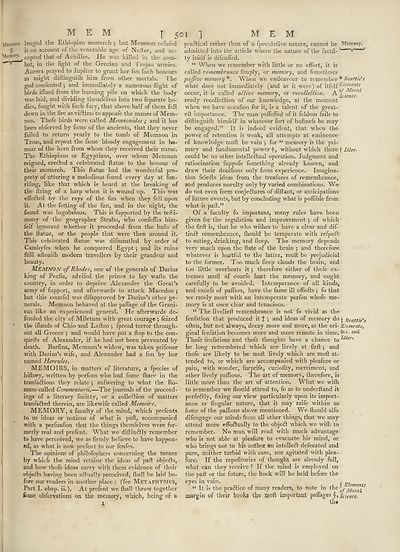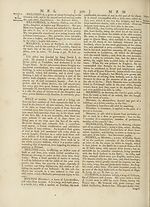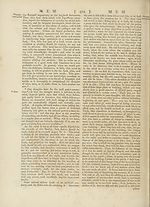Encyclopaedia Britannica, or, a Dictionary of arts, sciences, and miscellaneous literature : enlarged and improved. Illustrated with nearly six hundred engravings > Volume 13, MAT-MIC
(543) Page 501
Download files
Complete book:
Individual page:
Thumbnail gallery: Grid view | List view

MEM [50
ftfemnon lenged the Ethiopian monarch ; but Memnon refufed
|| it on account of the venerable age of Ntflor, and ac-
'Memory- ^ cepted that of Achilles. He was killed in the com-
T bat, in the fight of the Grecian and Trojan armies.
Aurora prayed to Jupiter to grant her fon fuch honours
as might diftinguiih him from other mortals. The
god confented j and immediately a numerous flight of
birds ifliied from the burning pile on which the body
was laid, and dividing themfelves into two feparate bo¬
dies, fought with fuch fury, that above half of them fell
down in the fire as victims to appeafe the manes of Mem-
non. Thefe birds were called Memnonides ; and it has
been obferved by fome of the ancients, that they never
failed to return yearly to the tomb of Memnon in
Troas, and repeat the fame bloody engagement in ho¬
nour of the hero from whom they received their name.
The Ethiopians or Egyptians, over whom Memnon
reigned, credited a celebrated ftatue to the honour of
their monarch. This ftatue had the wonderful pro¬
perty of uttering a melodious found every day at fun-
rifing, like that which is heard at the breaking of
the firing of a harp when it is wound up. This was
effected by the rays of the fun when they fell upon
it. At the fetting of the fun, and in the night, the
found was lugubrious. This is fupported by the tefti-
mony of the geographer Strabo, who confefles him-
felf ignorant whether it proceeded from the bafis of
the ftatue, or the people that were then around it.
This celebrated ftatue was difmantled by order of
Cambyfes when he conquered Egypt ; and its ruins
ftill aftonifli modern travellers by their grandeur and
beauty.
MEMNON of Rhodes, one of the generals of Darius
king of Perfia, advifed the prince to lay wafte the
country, in order to deprive Alexander the Great’s
army of fupport, and afterwards to attack Macedon •,
but this counfel was difapproved by Darius’s other ge¬
nerals. Memnon behaved at the paflage of the Grani-
cus like an experienced general. He afterwards de¬
fended the city of Miletum with great courage; feized
* the iflands of Chio and Lefbos j fpread terror through¬
out all Greece ; and would have put a flop to the con-
quefts of Alexander, if he had not been prevented by
death. Barfina, Memnon’s widow, was taken prifoner
with Darius’s wife, and Alexander had a fon by her
named Hercules.
MEMOIRS, in matters of literature, a fpecies of
hiftory, written by perfons who had fome (hare in the
tranfaflions they relate j anfwering to what the Ro¬
mans called Commentarii.—The journals of the proceed¬
ings of a literary fociety, or a colleflion of matters
tranfafted therein, are likewife called .Memoirs.
MEMORY, a faculty of the mind, which prefents
to us ideas or notions of what is pad, accompanied
with a perfuafion that the things themfelves were for¬
merly real and prefent. What we diftimftly remember
to have perceived, we as firmly believe to have happen¬
ed, as what is now prefent to our fenfes.
The opinions of philofophers concerning the means
by which the mind retains the ideas of paft obie£ls,
and how thofe ideas carry with them evidence of their
objedfs having been adlually perceived, (hall be laid be¬
fore our readers in another place : (fee Metaphysics,
Part I. chap. ii.). At prefent we (hall throw together
fome obferyations on the memory, which, being of a
I
i ] MEM
practical rather than of a fpeculative nature, cannot be Memory,
admitted into the article where the nature of the facul-
ty itfelf is difcuffed.
“ When we remember with little or no effort, it is
called remembrance (imply, or memory, and fometimes
pa five memory %. When we endeavour to remember * Beattie’s
what does not immediately (and as it were) of itfelf
occur, it is called active memory, or recollection. A
of Moral
Science.
ready recolledlion of our knowledge, at the moment
w’hen we have occafion for it, is a talent of the great-
eft importance. The man poffeffed of it feldom fails to
diftinguifti himfelf in whatever fort of bufinefs he may
be engaged.” It is indeed evident, that when the
power of retention is weak, all attempts at eminence
of knowledge muft be vain 5 for “ memory is the pri¬
mary and fundamental power f, without which there f Idler.
could be no other intellectual operation. Judgment and
ratiocination fuppofe fomething already known, and
draw their decifions only from experience. Imagina¬
tion feledts ideas from the treafures of remembrance,
and produces novelty only by varied combinations. We
do not even form conjedtures of diftant, or anticipations
of future events, but by concluding what is poflible from
what is paft.”
Of a faculty fo important, many rules have been
given for the regulation and improvement ; of which
the firft is, that he who withes to have a clear and dif-
tindl remembrance, (hould be temperate with refpeft
to eating, drinking, and (leep. The memory depends
very much upon the (late of the brain ; and therefore
whatever is hurtful to the latter, muft be prejudicial
to the former. Too much deep clouds the brain, and
too little overheats it; therefore either of thefe ex¬
tremes muft of courfe hurt the memory, and ought
carefully to be avoided. Intemperance of all kinds,
and excefs of pafiion, have the fame ill effects 5 fo that
we rarely meet with an intemperate perfon whofe me¬
mory is at once clear and tenacious.
“ The livelieft remembrance is not fo vivid as the
fenfation that produced it J 5 and ideas of memory do j Beattie's
often, but not always, decay more and more, as the ori- Elements,
ginal fenfation becomes more and more remote in time. &c- an^
Thofe fenfations and thofe thoughts have a chance to ^Icr.
be long remembered which are lively at firft $ and
thofe are likely to be mod lively which are moft at¬
tended to, or which are accompanied with pleafure or
pain, with wonder, furprife, curiofity, merriment, and
other lively paflions. The art of memory, therefore, is
little more than the art of attention. What we wi(h
to remember we (hould attend to, fo as to underftand it
perfectly, fixing our view particularly upon its import¬
ance or lingular nature, that it may raife within us
fome of the paflions above mentioned. We (hould alfo
difengage our minds from all other things, that we may
attend more effedtually to the objedft which we wi(h to
remember. No man will read with much advantage
who is not able at pleafure to evacuate his mind, or
who brings not to his author an intellect defecated and
pure, neither turbid with care, nor agitated with plea¬
fure. If the repofitories of thought are already full,
what can they receive ? If the mind is employed on
the paft or the future, the book will be held before the
eyes in vain. .
“ It is the praftice of many readers, to note in the G S
margin of their books the ipoft important paffages §, Science.
th«
ftfemnon lenged the Ethiopian monarch ; but Memnon refufed
|| it on account of the venerable age of Ntflor, and ac-
'Memory- ^ cepted that of Achilles. He was killed in the com-
T bat, in the fight of the Grecian and Trojan armies.
Aurora prayed to Jupiter to grant her fon fuch honours
as might diftinguiih him from other mortals. The
god confented j and immediately a numerous flight of
birds ifliied from the burning pile on which the body
was laid, and dividing themfelves into two feparate bo¬
dies, fought with fuch fury, that above half of them fell
down in the fire as victims to appeafe the manes of Mem-
non. Thefe birds were called Memnonides ; and it has
been obferved by fome of the ancients, that they never
failed to return yearly to the tomb of Memnon in
Troas, and repeat the fame bloody engagement in ho¬
nour of the hero from whom they received their name.
The Ethiopians or Egyptians, over whom Memnon
reigned, credited a celebrated ftatue to the honour of
their monarch. This ftatue had the wonderful pro¬
perty of uttering a melodious found every day at fun-
rifing, like that which is heard at the breaking of
the firing of a harp when it is wound up. This was
effected by the rays of the fun when they fell upon
it. At the fetting of the fun, and in the night, the
found was lugubrious. This is fupported by the tefti-
mony of the geographer Strabo, who confefles him-
felf ignorant whether it proceeded from the bafis of
the ftatue, or the people that were then around it.
This celebrated ftatue was difmantled by order of
Cambyfes when he conquered Egypt ; and its ruins
ftill aftonifli modern travellers by their grandeur and
beauty.
MEMNON of Rhodes, one of the generals of Darius
king of Perfia, advifed the prince to lay wafte the
country, in order to deprive Alexander the Great’s
army of fupport, and afterwards to attack Macedon •,
but this counfel was difapproved by Darius’s other ge¬
nerals. Memnon behaved at the paflage of the Grani-
cus like an experienced general. He afterwards de¬
fended the city of Miletum with great courage; feized
* the iflands of Chio and Lefbos j fpread terror through¬
out all Greece ; and would have put a flop to the con-
quefts of Alexander, if he had not been prevented by
death. Barfina, Memnon’s widow, was taken prifoner
with Darius’s wife, and Alexander had a fon by her
named Hercules.
MEMOIRS, in matters of literature, a fpecies of
hiftory, written by perfons who had fome (hare in the
tranfaflions they relate j anfwering to what the Ro¬
mans called Commentarii.—The journals of the proceed¬
ings of a literary fociety, or a colleflion of matters
tranfafted therein, are likewife called .Memoirs.
MEMORY, a faculty of the mind, which prefents
to us ideas or notions of what is pad, accompanied
with a perfuafion that the things themfelves were for¬
merly real and prefent. What we diftimftly remember
to have perceived, we as firmly believe to have happen¬
ed, as what is now prefent to our fenfes.
The opinions of philofophers concerning the means
by which the mind retains the ideas of paft obie£ls,
and how thofe ideas carry with them evidence of their
objedfs having been adlually perceived, (hall be laid be¬
fore our readers in another place : (fee Metaphysics,
Part I. chap. ii.). At prefent we (hall throw together
fome obferyations on the memory, which, being of a
I
i ] MEM
practical rather than of a fpeculative nature, cannot be Memory,
admitted into the article where the nature of the facul-
ty itfelf is difcuffed.
“ When we remember with little or no effort, it is
called remembrance (imply, or memory, and fometimes
pa five memory %. When we endeavour to remember * Beattie’s
what does not immediately (and as it were) of itfelf
occur, it is called active memory, or recollection. A
of Moral
Science.
ready recolledlion of our knowledge, at the moment
w’hen we have occafion for it, is a talent of the great-
eft importance. The man poffeffed of it feldom fails to
diftinguifti himfelf in whatever fort of bufinefs he may
be engaged.” It is indeed evident, that when the
power of retention is weak, all attempts at eminence
of knowledge muft be vain 5 for “ memory is the pri¬
mary and fundamental power f, without which there f Idler.
could be no other intellectual operation. Judgment and
ratiocination fuppofe fomething already known, and
draw their decifions only from experience. Imagina¬
tion feledts ideas from the treafures of remembrance,
and produces novelty only by varied combinations. We
do not even form conjedtures of diftant, or anticipations
of future events, but by concluding what is poflible from
what is paft.”
Of a faculty fo important, many rules have been
given for the regulation and improvement ; of which
the firft is, that he who withes to have a clear and dif-
tindl remembrance, (hould be temperate with refpeft
to eating, drinking, and (leep. The memory depends
very much upon the (late of the brain ; and therefore
whatever is hurtful to the latter, muft be prejudicial
to the former. Too much deep clouds the brain, and
too little overheats it; therefore either of thefe ex¬
tremes muft of courfe hurt the memory, and ought
carefully to be avoided. Intemperance of all kinds,
and excefs of pafiion, have the fame ill effects 5 fo that
we rarely meet with an intemperate perfon whofe me¬
mory is at once clear and tenacious.
“ The livelieft remembrance is not fo vivid as the
fenfation that produced it J 5 and ideas of memory do j Beattie's
often, but not always, decay more and more, as the ori- Elements,
ginal fenfation becomes more and more remote in time. &c- an^
Thofe fenfations and thofe thoughts have a chance to ^Icr.
be long remembered which are lively at firft $ and
thofe are likely to be mod lively which are moft at¬
tended to, or which are accompanied with pleafure or
pain, with wonder, furprife, curiofity, merriment, and
other lively paflions. The art of memory, therefore, is
little more than the art of attention. What we wi(h
to remember we (hould attend to, fo as to underftand it
perfectly, fixing our view particularly upon its import¬
ance or lingular nature, that it may raife within us
fome of the paflions above mentioned. We (hould alfo
difengage our minds from all other things, that we may
attend more effedtually to the objedft which we wi(h to
remember. No man will read with much advantage
who is not able at pleafure to evacuate his mind, or
who brings not to his author an intellect defecated and
pure, neither turbid with care, nor agitated with plea¬
fure. If the repofitories of thought are already full,
what can they receive ? If the mind is employed on
the paft or the future, the book will be held before the
eyes in vain. .
“ It is the praftice of many readers, to note in the G S
margin of their books the ipoft important paffages §, Science.
th«
Set display mode to:
![]() Universal Viewer |
Universal Viewer | ![]() Mirador |
Large image | Transcription
Mirador |
Large image | Transcription
Images and transcriptions on this page, including medium image downloads, may be used under the Creative Commons Attribution 4.0 International Licence unless otherwise stated. ![]()
| Permanent URL | https://digital.nls.uk/192668221 |
|---|
| Attribution and copyright: |
|
|---|
| Description | Ten editions of 'Encyclopaedia Britannica', issued from 1768-1903, in 231 volumes. Originally issued in 100 weekly parts (3 volumes) between 1768 and 1771 by publishers: Colin Macfarquhar and Andrew Bell (Edinburgh); editor: William Smellie: engraver: Andrew Bell. Expanded editions in the 19th century featured more volumes and contributions from leading experts in their fields. Managed and published in Edinburgh up to the 9th edition (25 volumes, from 1875-1889); the 10th edition (1902-1903) re-issued the 9th edition, with 11 supplementary volumes. |
|---|---|
| Additional NLS resources: |
|

